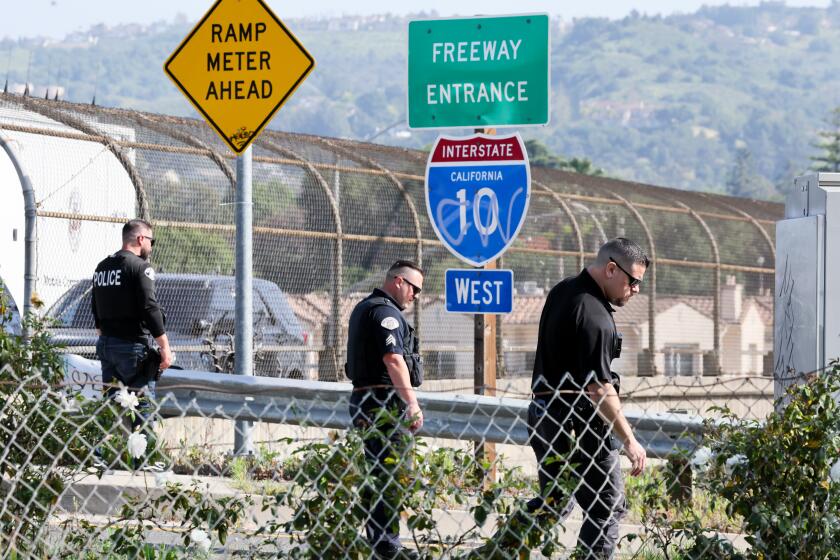Brown signs California Dream Act
Gov. Jerry Brown on Saturday granted illegal immigrants access to state financial aid at public universities and community colleges, putting California once again in the center of the nation’s immigration debate.
But he vetoed a measure that would have allowed state universities to consider applicants’ race, gender and income to ensure diversity in their student populations.
Deciding the fate of 50 education-related bills, the governor also rejected an effort to make it more difficult to establish charter schools. But he accepted a move to improve college life for gays, lesbians and bisexual and transgender people and a measure to restrict the privatization of libraries.
None of the other proposals, however, has drawn the attention — or rancor — surrounding the California Dream Act. Most Republican legislators voted against it, and anti-illegal-immigration groups denounced it as unfair.
Brown’s signature on the bill fulfilled a campaign promise to allow high-achieving students who want to become citizens the opportunity to attend college, regardless of their immigration status.
“Going to college is a dream that promises intellectual excitement and creative thinking,” Brown said in a statement. “The Dream Act benefits us all by giving top students a chance to improve their lives and the lives of all of us.”
Beginning in 2013, illegal immigrants accepted by state universities may receive assistance from Cal-Grants, a public program that last year provided aid to more than 370,000 low-income students.
The new law also makes students who are not legally in the country eligible for institutional grants while attending the University of California and California State University systems. And it permits them to obtain fee waivers in the community college system.
Students must graduate from a California high school after attending school in the state for at least three years and must affirm that they are in the process of applying to legalize their immigration status. They also must show financial need and meet academic standards.
The bill was by Assemblyman Gil Cedillo (D-Los Angeles), who praised Brown for showing courage in signing it.
“After having invested 12 years in the high school education of these young men and women, who are here through no fault of their own,” Cedillo said, “it’s the smartest thing for us to do to permit these students to get scholarships and be treated like every other student.”
Angelica Salas, executive director of the Coalition for Humane Immigrant Rights Los Angeles, said Saturday was “a great day for California, for education and for immigrant students who have kept their end of the bargain and continue to give their best to the only nation they know as their home.”
But Republican lawmakers and conservative groups assailed Brown for approving AB 131.
“It’s morally wrong,” said Assemblyman Tim Donnelly (R-San Bernardino). “We have just created a new entitlement that is going to cause tens of thousands of people to come here illegally from all over the world.”
Donnelly said he plans a referendum drive to repeal the legislation and believes the issue will hurt Democrats in next year’s elections.
Assemblyman Curt Hagman (R-Chino Hills) said Brown’s signature “absolutely sends the wrong message. It says if you violate the law, it’s OK.”
Also opposed is the Federation for American Immigration Reform, a national group pressing for a crackdown on illegal arrivals. Spokeswoman Kristen Williamson called the bill “a reckless use of taxpayer money” at a time when the state is broke, has raised tuition and has cut many services to legal residents.
Brown downplayed the cost to taxpayers. He said the California Department of Finance estimates 2,500 additional students will qualify for Cal-Grants as a result of the Dream Act, at a cost of $14.5 million.
The Cal-Grant program costs $1.4 billion, so about 1% of all Cal-Grant funds could be affected, the governor said.
But the community college fee waivers and institutional grants will likely increase the price tag. A Senate committee analysis has predicted that new costs resulting from the legislation would be $40 million a year, all told.
Brown signed another bill related to undocumented students Saturday, AB 844 by Assemblyman Ricardo Lara (D-Bell Gardens). It allows them to serve in student government on public campuses and receive grants, fee waivers and expenses for doing so.
The governor’s actions came while Congress is gridlocked over immigration reform and followed efforts by other states, including Arizona, Georgia and Alabama, to tighten laws on illegal immigration. But in 2001, Texas Gov. Rick Perry allowed undocumented students to pay in-state tuition at public universities. And earlier this year, Illinois Gov. Pat Quinn approved private financial aid for undocumented students and allowed them to enroll in state tuition savings programs.
“There’s division of opinion among the states about what to do about immigration,” said Kevin Johnson, dean of UC Davis School of Law. “We will continue to get these types of differences until Congress comes up with some kind of federal immigration reform and starts to answer some of those questions in a national, as opposed to a state, way.”
In California, the legislation that would have allowed the UC and Cal State systems to factor race and gender into admissions decisions was also controversial.
Sen. Ed Hernandez (D-West Covina) said he wrote the bill, SB 185, to avert a clash with a 1996 voter-approved prohibition against preferential treatment for minorities in public institutions. Brown’s veto statement said he agreed with the goal of the bill and noted that, as California’s attorney general, he had argued that courts should allow universities to consider race to the extent allowed by the U.S. Constitution.
But “our constitutional system of separation of powers,” he wrote Saturday, “requires that the courts — not the Legislature — determine the limits of Proposition 209,” the measure voters passed.
The governor also vetoed AB 86, which would have required at least half of the classified staff at a school to sign petitions for it to become a charter. Brown, who started two charter schools in Oakland, said in his veto message to Assemblyman Tony Mendoza (D-Artesia) that charter schools are already hard to establish and even more difficult to maintain.
Brown signed AB 438, by Assemblyman Das Williams (D-Santa Barbara), restricting the privatization of public libraries, a growing trend as municipal governments have fallen on hard times. Those that are privatized must continue to pay government wages.
The governor also approved a measure by Assemblyman Marty Block (D-San Diego) that will encourage state university systems to collect data on students’ sexual orientation and encourage the legislative analyst to use it to recommend improvements in the quality of life for gay, lesbian, bisexual and transgender students. That bill is AB 620.
More to Read
Start your day right
Sign up for Essential California for news, features and recommendations from the L.A. Times and beyond in your inbox six days a week.
You may occasionally receive promotional content from the Los Angeles Times.







